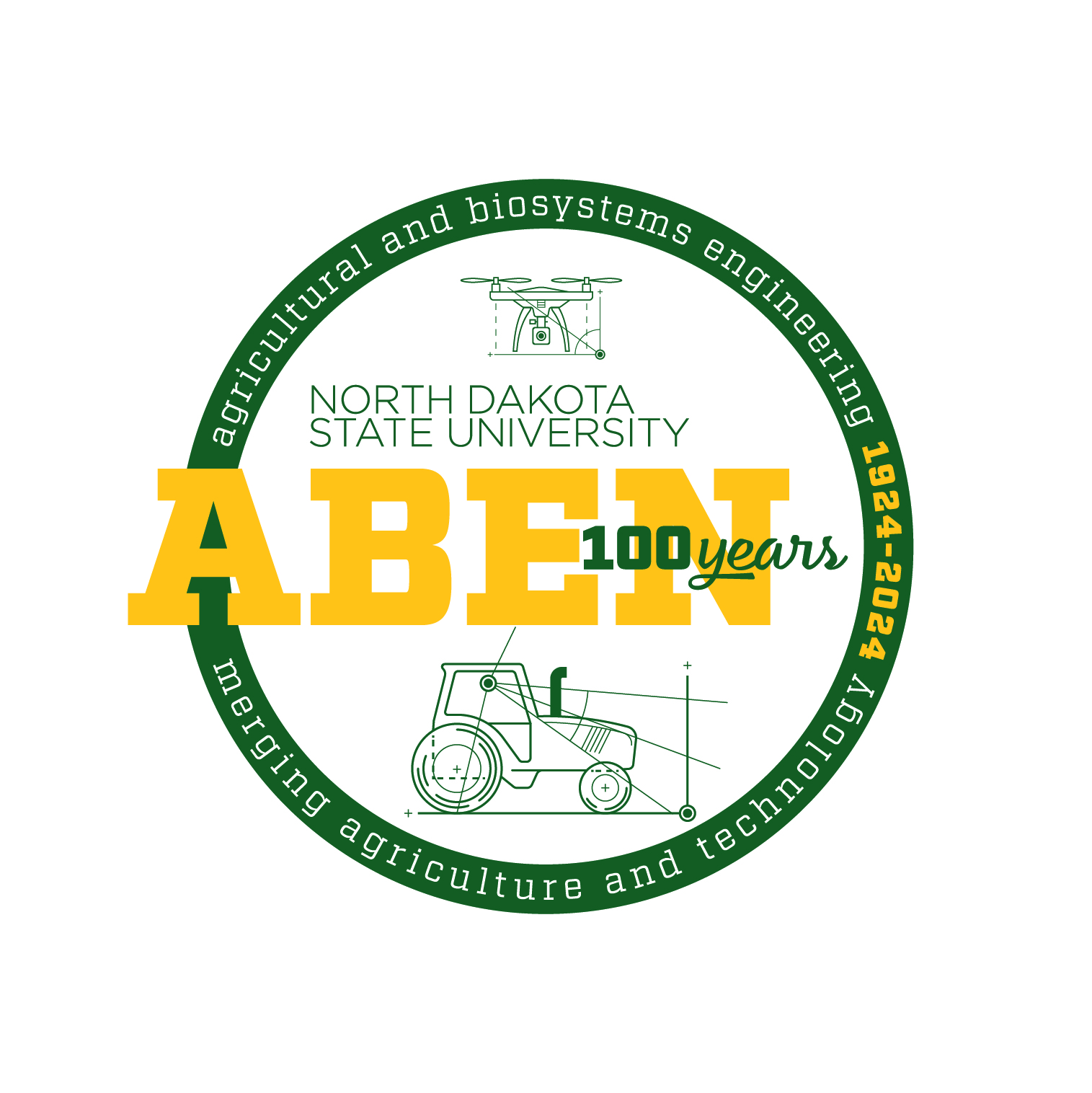Mauch wins Ag Tech Expo with innovative concept
February 15, 2024
Hosted by the North Dakota State University (NDSU) Agricultural and Biosystems Engineering Department, the 76th annual Agricultural Technology Exposition named Isaac Mauch as the grand champion this year.
The freshman presented his project, “Beneath the Soil Surface,” during the Feb. 10 event.
Mauch is pursuing a double major in precision agriculture and biotechnology at NDSU. He is a graduate of Lincoln High School in Thief River Falls, Minn., who decided to attend NDSU because of its program offerings.
“I toured NDSU and I fell in love with the program,” he says.
During the Agricultural Technology Exposition, students present on a topic related to technology within the agricultural industry.
As ABEN celebrates its 100th anniversary in 2024, Mauch wanted to explore technological advancements in soil nutrient testing over the past 100 years.
“I’ve done some work in the past with some soil labs, sending my soil samples into the lab to get tested, using your basic soil probes,” he says. “So, I asked the question, ‘What technology is used in those soil labs?’”
Soil labs use UV spectroscopy to detect molecule structures, so Mauch obtained a UV spectroscopy soil probe from Assistant Professor Dr. Paulo Flores to explore the technology further. The probe performs UV spectroscopy onsite for real-time soil data without the need for a lab.
Then, Mauch explored how to improve upon that technology, using a micro soil probe permanently placed in the soil for five to 10 years, depending on the lifespan of the battery, basically inventing a new concept for soil nutrient testing.
“Using drone data in conjunction with soil probes through AI software would provide accurate diagnosis and treatment plans to truly further precision agriculture management,” Mauch’s project display board states.
Through his project, Mauch also learned how to advance a product.
“I learned a lot, but mostly about the feasibility of starting a company. If this is a startup company, what were the steps I’d have to take? How cheap is this going to be? That’s what farmers want to know. You have to know the technology in and out. I learned a lot about UV spectroscopy in the short amount of time. But I also learned how you get this prototype to fruition,” he says.
“I’ve taken part in science fairs in the past. So, this class was just perfect. I loved continuing my experience from the science fair. The whole class is very well built. It’s geared toward senior level, but I think it was perfect for freshmen, because it gets me thinking this is a job I could do in the future. It very much gets you thinking about your future and the future of ag, too,” he says.
Mauch appreciated being able to visit with the public during the expo, he says.
“Farmers would come in from the area and they were so interested in what us kids were doing. That really gave me hope, too, that people are interested in us and what we’re exploring and they want to learn more about it. And that's kind of fun,” he says.
The Agricultural Technology Expo began in 1948 and was led by the student branch of the American Society of Agricultural and Biological Engineers and the Agricultural Systems Management Club. Today, this effort has evolved as a one-credit class at NDSU. This class provides an understanding of how to show and explain the latest innovations in agricultural technology. Students practice communication skills and learn task management. Higher-level thinking skills are demonstrated, as students prepare displays for public viewing and interaction. This is the largest student-led activity in the Agricultural and Biosystems Engineering Department.
More than $1,500 in scholarships are typically awarded during the event. Scholarships are awarded to the grand champion project, division winners and best freshman project.
Ag Tech Expo winners included:
Machinery Division: Nathan Schultz, “Do it All with NexAt”
Precision Agriculture Division: Isaac Mauch, “Beneath the Soil Surface”
Soil, Water and Environment Division: Sophia Schomer and Andrew Caughey, “Genetically Modified Crops for Pest Resistance”
Structures, Electrical Power and Processing Division: Lance Kjellberg and Aiden Pfeiffer, “Livestock Confinement Barns”
Power Division: Katelyn Kramer, “Steiger 715 Quadtrac”
Champion Freshman Project: Katelyn Kramer, "Steiger 715 Quadtrac”
Senior Design Champion: Dan Leidner and Wyatt Thorson, “Vaderstad Test Fixture”
Reserve Champion: Nathan Schultz, “Do it All with NexAt”
Grand Champion: Isaac Mauch, “Beneath the Soil Surface”
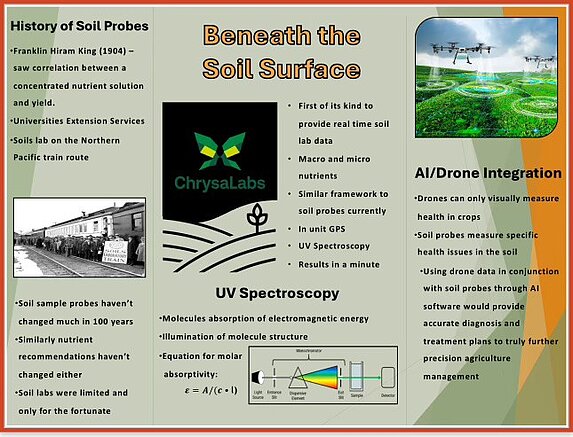

Kickoff to 100th anniversary celebration on Feb. 10
January 30, 2024

Celebrating its 100th anniversary in 2024, the North Dakota State University Agricultural and Biosystems Engineering (ABEN) Department will host a kickoff celebration in February! R.C. Miller first organized the Agricultural Engineering Department in 1924 as a degree-granting department.
The kickoff of the 100th anniversary celebration of the ABEN Department’s formation will be held during the Agricultural Technology Exposition banquet at 5:30 p.m. Saturday, Feb. 10, in the Memorial Union Ballroom.
During the 76th annual Agricultural Technology Exposition, students present on a topic related to technology within the agricultural industry. The Expo concludes with an evening banquet, with an invited speaker and the presentation of Expo awards.
This year’s speakers, Elton Solseng and Vernon Hofman, who are both retired ABEN faculty members, will give presentations on 100 years of the ABEN Department.
The dinner will be $25 per person, with proceeds going to fund a departmental scholarship.
Those who are interested in attending the Expo banquet and kickoff celebration should RSVP at https://forms.gle/CHC4uTjCKDRdsJMj7 by Thursday, February 1.
This is one of three main events planned in 2024 to mark the ABEN centennial, with commemorative keychains being developed to commemorate the anniversary.
Since 1924, the ABEN Department has provided students with the tools and knowledge to develop new technology and apply the science and expertise of agricultural engineering in a variety of settings related to agriculture. In addition, ABEN Department members with Extension responsibilities have provided invaluable training, education and assistance to constituents around the state and the country.
As the ABEN Department moves into its second century of service, we want to forge even more awareness of our history by telling our story. We welcome and encourage your help to shape and tell the story of our department by sharing historic or current photos, along with a brief description. Those may be emailed to emily.schwengler@ndsu.edu.
Bison Pullers steer toward success
June 27, 2023

The North Dakota State University (NDSU) Bison Pullers steered into a first-place finish in the durability category during the American Society of Agricultural and Biological Engineers (ASABE) International Quarter-Scale Tractor Student Design Competition in Peoria, Ill. The team also earned third place in overall performance across all events.
Team members are Evan Oberg, Robert Stephany, Michael Ritchie, Nathan Schilling, Lawson Kraft, Emma Arstein, Brandon Kasper and Nicholas Kuhlmann.
This year’s participants came from across the United States and Canada. Sponsored by ASABE, the quarter-scale tractor contest is unique among student engineering-design events, providing a realistic 360-degree workplace experience. It is a popular recruiting event for many sponsors, who find practiced, high-achieving prospects with strong technical, communication and leadership skills honed by competition experience.
The 2023 contest was held June 1-5 at the Peoria Expo Gardens in Peoria, Ill. The contest is a longtime tradition, with NDSU competing for about the past 24 years.
The Bison Pullers, which is an ASABE-sanctioned quarter-scale pulling tractor organization on the NDSU campus, competes each year in the event.
The organization’s goal is for juniors and seniors to design, construct and compete with a quarter-scale tractor for the A-team competition. The X team of freshmen and sophomores can bring back the tractor from the previous year with 20% updates/modification.
Other typical activities include fundraising for support from outside sources, public service, promotion of ASABE, presentation of the quarter-scale tractor at campus functions and more.
But it’s the quarter-scale tractor build that draws the attention.
Teams of students are provided with a 31-horsepower Briggs & Stratton engine and a set of Titan tires. The design of their tractor is up to them. Industry experts then judge each design for innovation, manufacturability, serviceability, safety, sound level and ergonomics. Teams also submit a written design report, and they sell their design in a formal presentation to industry experts playing the role of a corporate management team. Finally, machines are put to the test in three performance events – three tractor pulls, a maneuverability course and a durability course.
The durability course is a timed event through an oval course of bumps and loose soil while towing a weighted cart. Teams compete in the timed event by individually completing a quantity of laps in rough conditions, loose soil conditions and flat dirt.
Any interested students in good standing with NDSU can join. All experience and skill levels are welcome.
The Bison Pullers meet at the service center/pilot plant most Thursdays during the fall and spring semesters at 5:30 p.m. They also have large group meetings at least once a month at 5:30 p.m. on Thursdays.
Advisor Matt Olhoft encourages incoming students to join.
“First, you get to know the older students on a personal basis, which is always beneficial,” he says. “And it’s a way for them to practice those skills they’re learning in the classroom. … When you do a whole project from start to finish, you learn a lot.”
“They get to practice engineering skills. They use a CAD program to design the whole tractor and they also conduct a stress analysis of the different parts of the tractor to look for any kind of failure points before they actually make the tractor,” he describes.
Fabrication skills are also involved, shaping the steel and welding it together.
“Then, of course, there’s good old trial-and-error,” he says.
The Bison Pullers club members are highly employable, he points out.
Alumni working at agricultural manufacturing facilities who participated when they were students understand the devotion given and experience gained for the Bison Pullers, he says.
“Those former alumni can really appreciate those current students who are doing this. It is a big deal when they apply for jobs and they have that on their resume and their future employer recognizes that. It does move them to the top of the list,” he says.
Other advisors are Dr. Sulaymon Eshkabilov and Brian Gregor.
PAG graduate makes history
May 10, 2023
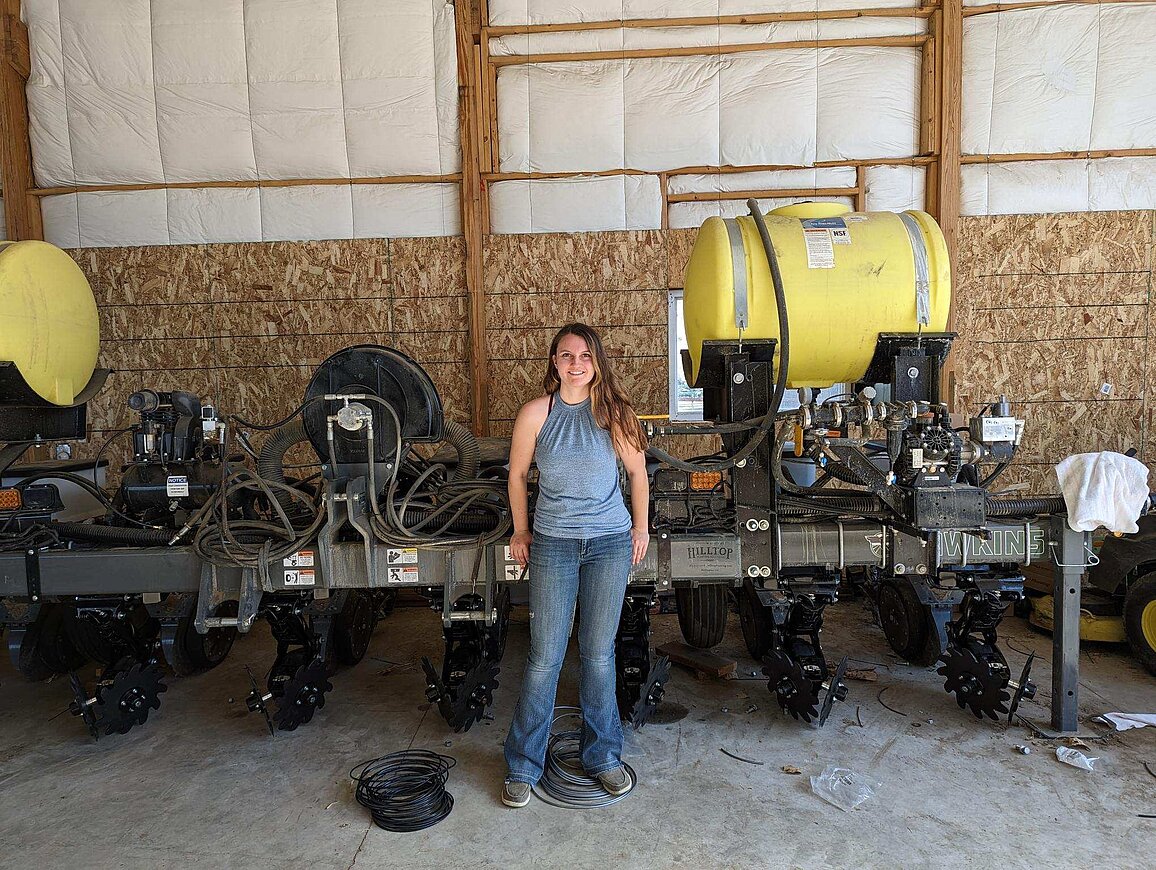
As the first female graduate from the precision agriculture program at North Dakota State University’s Department of Agricultural and Biosystems Engineering, Melanie Hansen-Wright has some advice for other young women pursuing a career in precision agriculture.
“I’d tell them to chase their dreams, no matter what. Don’t listen to those saying you can’t do it. They aren’t living your life. Just focus on you, set your bar high and pave your own path,” she says.
Hansen-Wright, a native of Longmont, Colo., tried other programs before deciding that obtaining a bachelor of science degree in precision agriculture was the path she wanted to pave.
As one of only a few universities in the United States offering a precision agriculture bachelor of science degree, NDSU was her choice after she obtained two-year degrees and certificates elsewhere.
She obtained an associate of science degree in agribusiness and an associate of applied science degree in production agriculture, along with certificates in precision ag, precision ag technology, ag business management, production agriculture-crops and production agriculture-mechanics.
This May, she will have minors in ag business and ag systems management as well.
“To be the first to graduate at NDSU with a bachelor’s in precision ag as a female is pretty remarkable, because right now there are only four women between both the precision ag and ag systems managements majors enrolled,” she says. “Being a woman in precision ag is pretty unique, since it still is a male-dominated industry.”
“Part of the reason I came here for a four-year degree was I was really interested in working for John Deere as an Intelligent Solutions Group consultant, but they won’t actually consider any applicants for the ISG position if they don’t have a bachelor’s degree,” she says.
She now plans to take her skills back to her family operations.
She grew up on a farm in Colorado and her husband farms in Kansas, so she will be returning to help with both operations following graduation. In Kansas, she and her husband raise wheat and milo, while her family raises corn, alfalfa, barley and wheat in Colorado. The family spends time in both states, so she will be active in both operations.
“I think the knowledge from the ASM classes that we have to take in addition to courses in precision ag truly is the bread and butter of the farm operations. And then, the technology we learned in the precision ag program helps to be able to know how to fix what’s going on without having to call a dealership and having them send someone out. Especially on your own farm, to be able to work on your own monitor and be able to know exactly what's going on and how you can use every aspect is huge,” she says.
She appreciated the opportunities she had at NDSU, where she was readily accepted, she says.
“There’s so much technology that they have access to, and the knowledge all the teachers have, but also just the faculty in general. They’re all so caring of each and every one of their students. I thought that was really amazing,” she says of the ABEN program. “They care about you as a person and they want to see you succeed in whatever path you go on, not just as a grade in their class.”
“NDSU is just an amazing school and the department is just amazing. The faculty, the staff, your peers, they make it worth the experience,” she says.
Van Berkom, Drovdal win Ag Tech Expo
March 2, 2023
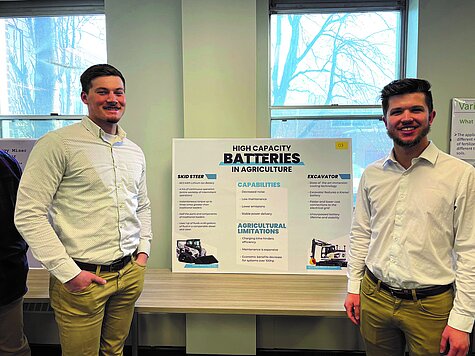
Hosted by the North Dakota State University (NDSU) Agricultural and Biosystems Engineering Department, the 75th annual Agricultural Technology Exposition named Ben Van Berkom and Scott Drovdal as the grand champions this year.
The two NDSU seniors presented their project, “High Capacity Batteries in Agriculture,” during the Feb. 11 event. Van Berkom is a precision agriculture major, while Drovdal is majoring in agribusiness. Both are graduates of Des Lacs-Burlington High School.
During the Agricultural Technology Exposition, students present on a topic related to technology within the agricultural industry.
Van Berkom and Drovdal explored the technology being advanced by companies such as Bobcat and John Deere in battery-powered equipment. The project explored the advantages and disadvantages of the batteries and specifications on how they operate.
“The biggest learn from it, content-wise, was the fact that there are so many variables that go into electric or battery-powered machinery,” Van Berkom said. “One thing I really enjoyed about this project is the learning I was actually able to do as I presented it. I learned more presenting it than I did while I was preparing it. I thought that was fun. I love learning.”
The Agricultural Technology Exposition is also a great environment to hone presentation skills, he said, and to have balanced conversations.
“It is a hotly debated topic. I thought it was fun to practice presenting information and having open conversations about a topic that can sometimes be a more of a heated topic,” he said.
After serving as the North Dakota state FFA president in 2019-20, Van Berkom initially started a major in agriculture education at NDSU.
“That was a huge part of my high school career and really opened up a lot of doors for me. I thought I might as well just invest back into the thing that made a difference in my life,” he said. But after taking precision ag classes to fill his electives, he discovered a new interest.
“I’ve loved the precision agriculture program,” he said. “I think there are incredible job opportunities in the Fargo area with a precision agriculture degree.”
The Agricultural Technology Expo began in 1948 and is sponsored by the student branch of the American Society of Agricultural and Biological Engineers and the Agricultural Systems Management Club. It is the largest student activity in the Department of Agricultural and Biosystems Engineering.
More than $1,500 in scholarships are typically awarded during the event. Scholarships are awarded to the grand champion project, division winners and best freshman project.
Ag Tech Expo winners included:
Grand Champion Scott Drovdal and Benjamin Van Berkom, “High Capacity Batteries in Agriculture” | Reserve Champion Eric Koch, Kyle Senger and Ian Swenson, “Sensors in Agriculture” | Champion Freshman Project Eric Koch, Kyle Senger and Ian Swenson, “Sensors in Agriculture” |
Machinery First place - Alex Nelson, “The Weed Zapper” Second place - Ben Bloom and Jonah Friedrichs, “Case Autonomous Tractor” | Precision Ag First place - Ty Longtin, “Biometric Sensing Ear Tag” Second place - Mathew Nepsund, Jacob Vogt and Mathew Heley, “Autonomous Robot for Specialty Crops” | Soil, Water & Environment First place - Eric Koch, Kyle Senger and Ian Swenson, “Sensors in Agriculture” Second place - Tate Reichmann, Nicholas Popp and Jack Thompson, “The Future of Irrigation” |
Structures, Electrical Power & Processing First place - Hayden Quittenschreiber, “Ag Optimus System” | Power First place - Trevor and Daniel Hinkle, “Self Propelled Beet Lifter” | Senior Design First place - Kenny Meyer, Kate Wrolson, and Jarad Mattis, “Quadtrac Rear Frame Implement Harness Routing” Second place - Shad Mack, Mason Falk and Wilson Howard, “Amity Crop Chaser” |
Lester selected as commencement speaker
December 12, 2022
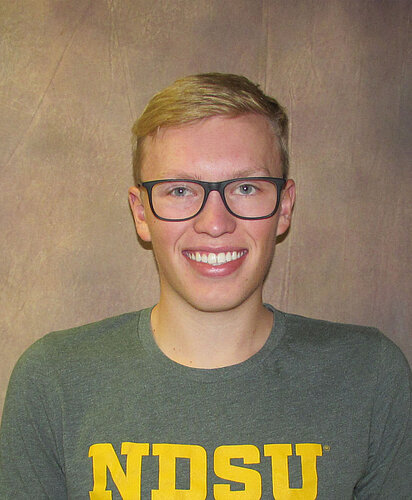
Justin Lester, a senior in the Department of Agricultural and Biosystems Engineering (ABEN), will be the student speaker during North Dakota State University’s winter commencement ceremony Friday, Dec. 16, at the Sanford Health Athletic Complex.
Lester, a native of Buffalo, Minn., will graduate with a degree in agricultural and biosystems engineering, with a focus on natural resources.
“I think it is a very special honor,” Lester says about being selected to give the commencement address, in which he will focus on the quote, “Believe in yourself and you will do great things.”
While in high school, Lester took advantage of the post-secondary enrollment option in Minnesota, which allowed him to graduate early from NDSU.
When Lester visited the NDSU campus for the first time, it simply felt like the right fit.
“When I visited, it felt like the right one. It is a little bit smaller, so it was more personal, but big enough that I had a lot of opportunities with student organizations. I just like the feel of the campus. I always tell students as an engineering ambassador it just felt like the right place and that's the most important thing,” he says.
And the ABEN Department drew Lester’s attention due to its degree offerings.
“I can focus on engineering and problem-solving, but also have a natural resources focus, so I can do something to hopefully improve the environment,” he says. “Graduating with an engineering degree proves you are a good problem-solver.”
As a freshman, Lester was part of the Engineering Living Learning Community, sharing a dorm with other engineering students.
“I was able to really take advantage of that to get off on the right foot with different connections as well as meeting a lot of people for studying,” he says.
He also became a College of Engineering ambassador, focusing on the ABEN Department, introducing other students to the campus. And he was a Grand Challenge Scholar, an organization which helps undergraduate students gain the ability and knowledge to address future challenges. Lester is also a member of Alpha Epsilon, the ABEN honor society.
Lester gained experience by assisting Dr. Xinhua Jia’s drip irrigation trial, which studied automatic drip irrigation with remote access for commercial production of melons and squash.
Working with graduate students during the research trial helped him understand their role, he says.
“And from a professional standpoint, I think it really helped in my technical writing skills and my presentation skills,” he says.
“With the ABEN Department specifically, I have really enjoyed how personal the learning experience is, and developing a really good relationship with both the students and the faculty makes for a more enjoyable college experience,” he says.
Lester recommends the ABEN Department to other students due to its open-door policy and family-like atmosphere.
“It’s very broad in what you can do,” he adds about the department. “They do a good job introducing you to all the options and it’s very flexible.”
He also appreciated the hands-on aspects, taking classroom work directly to the lab.
“I think that was really valuable to have a lot of those more theoretical-based classes have a hands-on component to understand it better,” he says.
Reflecting on his college career, Lester sees how much he’s grown as a person throughout college.
During his freshman year’s learning community leadership seminar, the students were asked to line up according to how they saw themselves as a leader.
“I remember going somewhere probably two-thirds on the side of not being a very good leader,” Lester recalls. “Now, I feel like through the different organizations and class projects, I have really developed myself and gotten a lot more confident with speaking. So, I think that would probably be the proudest moment is my development throughout the entire time.”
“I would line up much differently now,” he adds.
Lester interned at Kimley-Horn in St. Paul, Minn., and will now join the consulting firm full time after graduation on the development services team, a team that helps with the planning and design of residential, commercial and industrial projects.
“I think the internship experience is great,” he says. On-campus career fairs help connect students with companies, making the process seamless.
“An internship is a two-way interview process,” he says, as students experience the company’s culture firsthand and the company becomes familiar with the student as a potential employee.
“It’s important to find something that you’re passionate about,” he says.
Sean Hertz follows in family footsteps
November 4, 2022

Sean Hertz knows about adversity. He’s watched family members suffer the consequences of drought and tanked commodity prices. But the 23-year-old is returning as the fifth generation of family farmers with confidence, after obtaining a degree in agricultural systems management (ASM) through North Dakota State University’s (NDSU) Department of Agricultural and Biosystems Engineering.
Sean now farms alongside his parents, Shane and Stacey Hertz, as one of several young farmers and ranchers who have returned to their roots in Hettinger County.
Sean graduated from Mott-Regent High School in 2017, then graduated in December 2020 from NDSU with a degree in agricultural systems management and minors in crop and weed science and agribusiness. Everyone needs to make the decision about attending college themselves, he says, but he gained from his college experience.
“I went into it with the mindset that I wanted to get something out of it,” he says. And with the ASM major, he had the flexibility to obtain two minors.
“I got a really broad range of classes, from taking a bunch of marketing classes to help with marketing our grain or taking welding classes to improve my welding skills or going to a crop scouting seminar and getting my private applicator’s license,” he says.
Sean first learned about the degree from an upperclassman from Mott.
“It really just kind of sparked my interest and sounded like something that would fit me really well,” he said. “I was drawn to ag systems management, mostly because of how versatile (the ASM program) was.”
Sean points to the senior capstone class, in which his project focused on farming succession, as another valuable class at NDSU.
To transition into the family farm, Sean is currently farming his own land to establish himself, then plans to eventually be melded into the whole operation, and he will rely on information from his senior capstone class project to guide him during that transition.
“When it’s my turn to take over the operation, I think (the ASM senior capstone) will come in handy,” he says. “I’m slowly starting to branch off onto my own, taking a few acres here and there.”
Sean also branched out beyond his department to take versatile, hands-on courses, including a welding course, to gain more experience with state-of-the-art equipment.
“There are countless other classes you can mix in with your course load,” he says.
Connecting with other young farmers in college was another advantage, he says.
“Being around a lot of like-minded young farmers and seeing their perspectives was kind of eye-opening. Being in Fargo and being around some Red River Valley farmers, who had totally different views on farming than we do, overall was a really good experience just to broaden my knowledge base,” Sean says.
During college, Sean served as president of the Agricultural Systems Management Club, which was another valuable networking tool for him, even though it wasn’t part of the course load.
“I had a really good time with that and I met a lot of lifelong friends through the club,” he says. “There are aspects of that club that I use to this day as well.”
Sean’s father, Shane, also sees Sean’s college education as a valuable asset to the family farm.
“I think you have to constantly be learning,” Sean says. “My classes at NDSU and in ag systems management really made me look through a different angle on what I’m doing when I’m farming. … You start focusing on returns on investments and you look at tractors based on when you should be buying and selling based off of when their value is the greatest and when you’re going to start losing your return on them. I think I started looking at things a little differently than before I went to NDSU.”
As Sean harvests corn on the family farm which dates back to 1905, he encourages others to pursue an NDSU degree through the Department of Agricultural and Biosystems Engineering.
“Give it a shot. At least take a tour, talk with some of the professors. There are some really good professors that I had at my time there. There’s a lot of them I would consider a friend now, and someone I could call if I had a question and I know they would help me out,” he says. “Go see what it’s all about and then you can make that decision for yourself.”
Sean points to his grandfathers and parents as role models, with memories of tinkering in the farm shop with his maternal grandfather, Ray Zent.
“I had a lot of fun doing that with him and I remember riding with my Grandpa Milt in the combine and my parents when they were seeding. A lot of things that I do I trace back to specific situations watching them and now trying to do hopefully as good as they did it,” he says.
Freshman perspective: ABEN degree
October 12, 2022
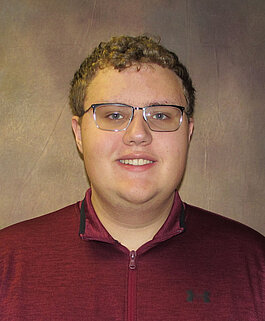
Ian Swenson isn’t a “farm kid,” but with a passion for engineering, he intends to make a difference in the agricultural industry nonetheless.
“I think a lot of people come into it with a farming background, but I think as long as you have a passion for food, biomaterials, machinery or technology, and you work hard in the major and your degree, you’ll be just fine,” he said.
A graduate of West Fargo High School, the freshman is majoring in agricultural engineering through North Dakota State University’s Department of Agricultural and Biosystems Engineering.
Through his Boy Scout troop, Swenson personally knows Julie Bietz, the student coordinator for the department, who mentioned the degree option to him.
“She knew I had a passion for engineering, so she suggested it to me,” he said.
“Agricultural engineering is something unique and there’s a lot of opportunity for graduates to work with machinery, processing and natural resources. So, I thought it would be an interesting major and career,” he said.
As a native of West Fargo, NDSU’s proximity was also a factor in his decision.
“NDSU also has a really good agricultural engineering program, and I thought that was a big bonus,” he said.
Swenson is also a research assistant for Dr. Dean Steele, an associate professor in the NDSU Department of Agricultural and Biosystems Engineering, who is doing research using soil moisture sensors.
“I think it’s going well so far. I like working with him,” Swenson said.
With that experience and hands-on classroom projects, Swenson is confident his degree will lead him to a fulfilling career.
“I think I’d eventually like to end up either working on design or working on production and manufacturing someplace in the Fargo area,” he said.
Freshman perspective: ASM degree
October 10, 2022
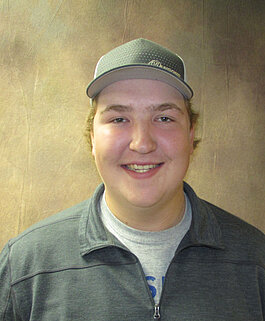
While Karson Matejcek’s career path points him back to the family farm near Brocket, having a college degree in his pocket beforehand will be a valuable tool.
A graduate of Lakota High School, the freshman is majoring in agricultural systems management through North Dakota State University’s Department of Agricultural and Biosystems Engineering.
He learned about the degree opportunity from other NDSU students, and his older brother attended the University of Minnesota Crookston to obtain a similar degree.
“I learned about the major through my brother and talking to others in the program at NDSU. They spoke highly of it,” he said.
He felt the degree will give him options for the future, as well.
“After looking into it, I decided it was a good choice, because I could use it if I come back to our family farm. Or, if that opportunity wasn’t there, I could go out and easily get a job doing a lot of other things, whether at an equipment dealership or feed sales or chemical sales,” he said.
He decided to attend college at the encouragement of his father.
“My dad wanted me to get the experience, and it’s good to have that backup plan in place,” he said.
He looks forward to hands-on opportunities in the classroom, particularly classes from Matthew Olhoft, a senior lecturer in the Department of Agricultural and Biosystems Engineering.
ABEN offers course for drone pilots
October 5, 2022
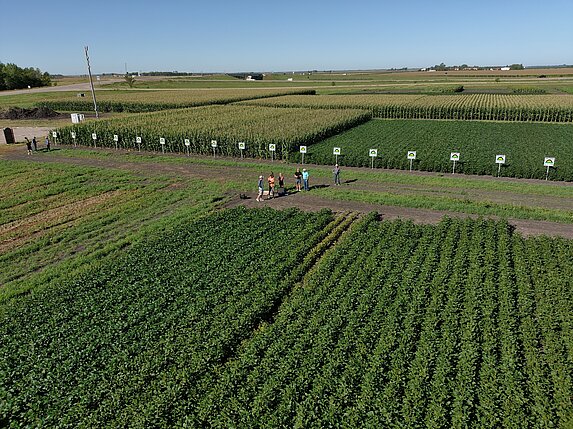
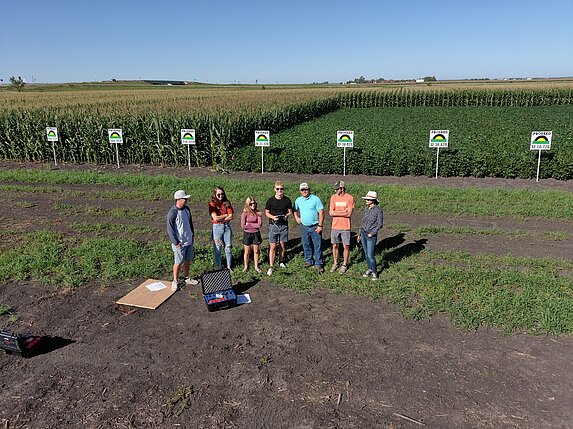
A course focusing on flying drones commercially is being offered for the first time this fall through the Department of Agricultural and Biosystems Engineering at North Dakota State University (NDSU).
The course, Precision Agriculture 291, “Drone Pilots for Agricultural Operations” is new this semester as a trial course in the Precision Ag curriculum. The course is taught by Dr. Nadia Delavarpour, a post-doctoral research assistant, under the supervision of Dr. Paulo Flores, an assistant professor.
As pilots send unmanned aircraft systems (UAS) skyward for commercial use, Federal Aviation Administration (FAA) requirements must be met.
That UAS flight requires more than just the pilot wearing those cool sunglasses.
So, the course’s objective is to give an in-depth, hands-on opportunity for students to prepare themselves to take and pass the FAA Part 107 commercial drone pilot’s license test.
That includes how to get detailed information regarding air spaces, air space classifications, applicable regulations for each classification, preparing certain FAA reports, operating requirements, flight restrictions, weather and other topics.
“We go through all the aeronautical knowledge topics created by the FAA,” Delavarpour said.
The class also includes two field experiences for students to fly drones. One includes a session during which the students fly the drones manually without apps or software, while the second session allows students to fly the drones autonomously using apps without human interference.
Students in the precision ag degree program take classes related to data mapping, remote data analysis and site-specific agriculture using aerial data collection, such as drone imagery, but that data must first be collected through unmanned aircraft systems (UAS) applications.
“With the use of drones, it is possible to get an overview of fields and collect data much faster and more efficiently than traditional methods. The basic need is to be able to gather the data for this purpose,” she said.
Besides the agricultural domain, drones are being used in many different applications, including wildlife and historical conservation, construction, surveillance and in the military, which has brought students from many different backgrounds and departments, Delavarpour said.
Students in the class are currently enrolled from computer science, agricultural and biosystems engineering, ag systems management, precision ag and general agriculture.
Pilots flying drones heavier than 55 pounds or flying commercially must have a license. Farmers using drones for spraying must also obtain certain waivers and permissions.
“Some people think just purchasing the drone and getting the license will be enough to do any kind of operation, but it’s not like that,” she said.
“This course is to make sure nobody is violating any rules and regulations and to ensure the remote pilot in command understands the regulations, operating requirements and procedures for safely flying drones for the drone itself and for people who are in the area of operation,” Delavarpour said.
According to the Association for Unmanned Vehicle Systems International, the drone industry is expected to create more than 100,000 jobs and provide more than $82 billion in economic impact by 2025 in the United States.
Big Iron 2022 - September 13-15
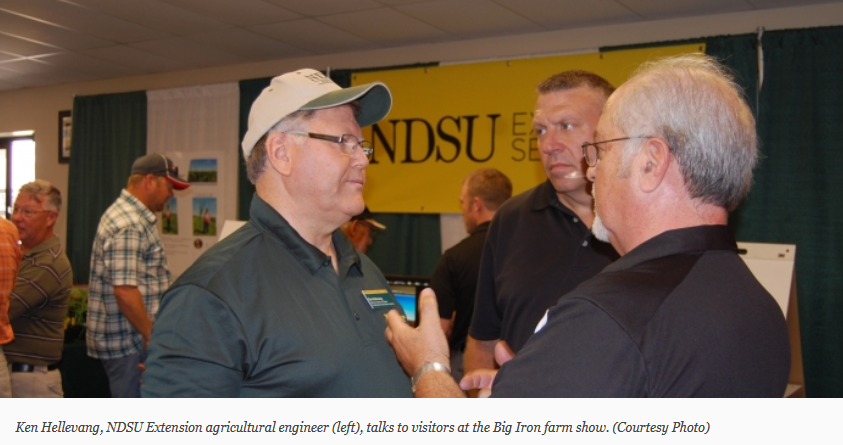
Our NDSU Extension personnel are gearing up for the upcoming Big Iron Farm Show in West Fargo, September 13-15. NDSU Extension will have exhibits at the east end of the Hartl Ag Building in booths AL 10 - AL 12. In addition, Extension agents and specialists will be available to answer questions about crop and livestock production, and other rural topics.
To read more: https://www.morningagclips.com/ndsu-extension-offering-education-at-big-iron-2/
Callander named Ag Tech Expo winner
March 2, 2022
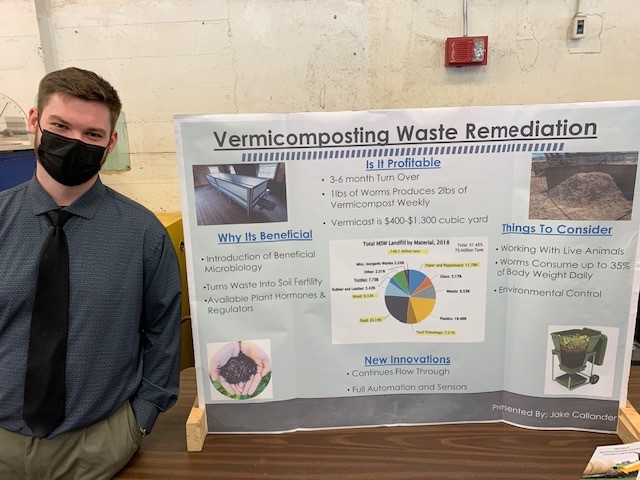

A North Dakota State University (NDSU) senior, Jake Callander is the grand champion of the 74th annual Agricultural Technology Exposition.
Hosted Feb. 12 by the NDSU Agricultural and Biosystems Engineering Department, the title of this year’s expo was “Innovation in Agriculture.”
Students in agricultural systems management, agricultural and biosystems engineering, or precision agriculture present on a topic related to technology within the agricultural industry.
Majoring in agricultural systems management, Callander’s project, “Vermicomposting Waste Remediation,” introduced his work in vermicomposting and composting to the public.
“Vermicomposting is composting using decomposer worms. It’s using a special type of earthworm to break down the organic material into something usable and higher quality than typical compost,” he explained.
Involved with his family farm near Hillsboro, Callander also operates a market farm on the side.
In 2019, he started researching composting and vermicomposting, then began with a 5-gallon tote bin of earthworms in his garage. About six months later, he converted a cattle trough feeder into a worm bin.
He started with a couple thousand worms, building the bin with organic material. In about two to three months, the worms had produced the finished product that can be harvested from the bin.
During the Agricultural Technology Exposition, students present their projects to the public and staff who stop to ask questions.
“A lot of people who came up to me during the presentation didn’t have any idea what the project was about,” he said.
“It was explaining how we can take any organic material from either our farms that is coming from manure or from our vegetable production or extra crop residue, and instead of paying somebody to haul it away and discard it, we can actually turn it into something that is usable on our farms to reduce our fertilizer inputs or to make a profit off of it,” he said.
“Talking to the public was a lot of fun, being able to speak to a bunch of different people who may have never heard of some things like this,” he said.
The Agricultural Technology Expo began in 1948 and is sponsored by the student branch of the American Society of Agricultural and Biological Engineers and the Agricultural Systems Management Club. It is the largest student activity in the Department of Agricultural and Biosystems Engineering.
More than $1,000 in scholarships are typically awarded during the event. Scholarships are awarded to the grand champion project, division winners, best freshman project, and a people’s choice award.
Callander was surprised to be named grand champion, considering the “low tech” aspect of his project.
“I was very shocked. A lot of the other projects were about big ag and technology,” he said. “My project was talking about worms and how they can break down organic material, so it was a shock.”
“It was a lot of fun,” he added.
Ag Tech Expo winners included:
Machinery
First place - Bill Huber, “Amity Technology Crop Chaser Silage Cart”
Second place - Zach Mcfarland, “Tracks vs. Tires”
Third place - Benjamin Johnsrud, Levi Skjerven, Morgan Penning, “John Deere Autonomous Tractor”
Precision Ag
First place - Krista Rambo, “Reveal: The New Row Cleaner”
Second place - Carson Hovelson, Joe Ellison, “John Deere Exact Apply Nozzles vs. Conventional Nozzles”
Third place - Tyler St. Onge, Cole Nissen, Wyatt Thorson, “Current Spray Drone Technology in Agriculture”
Soil, Water & Environment
First place - Jake Callander, “Vermicomposting Waste Remediation”
Second place - Broden Frolek, Isaac Huber, John Rath, “Carbon Sequestration and the future of Carbon Credits”
Champion Freshman Project
Riley Schafer, Justin Roswick, Ryan Doe, “What in the World is a Grain Weevil?”
Senior Design Champion
Justin Lester, Danika Tweeten, Landon Wanner, “Water Retention Pond”
People’s Choice
Krista Rambo, “Reveal: The New Row Cleaner”
Reserve Champion
Bill Huber, “Amity Technology Crop Chaser Silage Cart”
Grand Champion
Jake Callander, “Vermicomposting Waste Remediation”
2022 Ag Tech Expo set for Feb. 12th
February 3, 2022
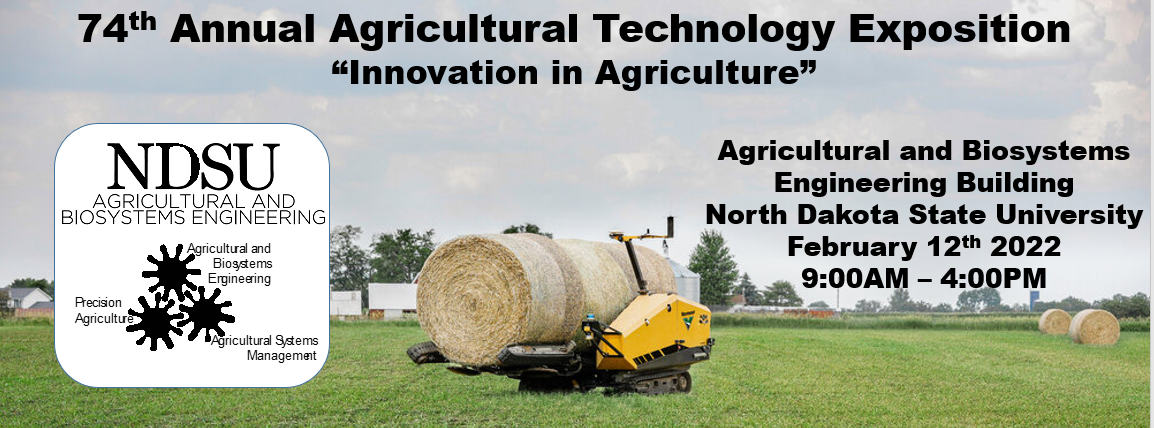
The 74th annual Agricultural Technology Exposition is scheduled for Saturday, Feb. 12, from 9 a.m. to 4 p.m. in NDSU’s Agricultural and Biosystems Engineering Building. The title of this year’s expo is “Innovation in Agriculture.”
Each student who graduates with a degree in agricultural systems management, agricultural and biosystems engineering or precision agriculture is required to present on a topic related to technology within the agriculture industry.
The Agricultural Technology Expo began in 1948 and is sponsored by the student branch of the American Society of Agricultural and Biological Engineers and the Agricultural Systems Management Club. It is the largest student activity in the Department of Agricultural and Biosystems Engineering.
More than $1,000 in scholarships are typically awarded during the event. Scholarships include Grand Champion project, division winners, Best Freshman project and a People's Choice award. Prizes also are given for the top projects in each division.
The event is open to the public, and attendees are encouraged to vote for their favorite projects.
Student-athlete tackles ABEN degree
December 21, 2021
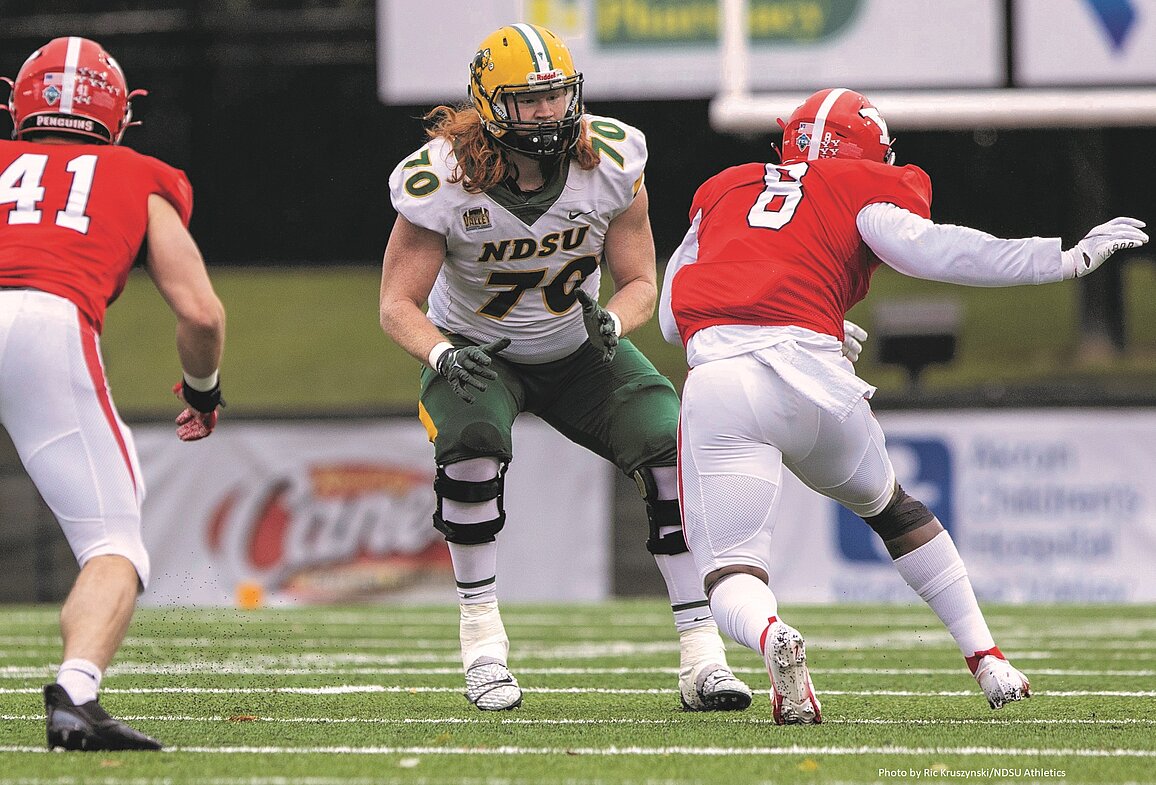
With his long, auburn hair and 6’6” frame, Cody Mauch is probably recognizable on the North Dakota State University (NDSU) campus – and the football field.
An offensive tackle for the NDSU Bison football team, Cody wears No. 70 on the field. Off the field, he’s earning a Bachelor of Science degree in agricultural and biosystems engineering from NDSU.
As a student-athlete, juggling the weightroom and the classroom has been a challenge, but Cody has found support across the entire campus, from professors, advisors, coaches, teammates, classmates and the Student Success Programs.
The son of Joseph and Stacey Mauch, Cody graduated from Hankinson High School in 2017 and is a fifth-year senior at NDSU, with plans to return to the family farm with his degree in hand.
He appreciates the ability to combine both agriculture and engineering into one degree.
“I grew up on a farm and I had a teacher in high school talk to us about the engineering field and that kind of interested me, but I knew I wanted to do something with farming. Then, I found out about ag engineering and I thought that would allow for a little bit of both,” he said.
“I’ll take what I’ve learned from school and hopefully help on the farm with that,” he said. “But this is also a good degree if farming doesn’t work out.”
The family farm is located just outside of Mantador and raises corn, soybeans, edible beans and sugar beets, and does custom baling.
Cody was a standout athlete in high school, arriving at NDSU as a preferred walk-on tight end, then transitioning to offensive tackle. He has been a part of the Bison winning tradition, playing as part of three NCAA Division I FCS national championship teams.
While those championships are the golden goal, Cody understands the classroom is the priority.
“A lot of people could get caught up in just worrying about their sport, but the reason you’re here is to get a degree, so you want to make sure you do well in school, while also doing as well as you can in your sport,” he said. “So, the challenge is to balance athletics and academics.”
The athlete’s days are a blur of lifting weights, watching film, two-hour practices, meetings, weekend games, attending class and homework.
“You have to get in the mood to do school, then you have to get in the mood to do football. You have to lock your brain into what you’re doing,” he said.
Communication with professors is paramount, but they are understanding of his schedule, he says, and academic advisors within the department are knowledgeable – and they like to visit about football, too, Cody said.
Within the Student Success Programs, the Athletic Academics staff provides academic support for student-athletes, making sure they are on track to graduate and achieve their academic goals.
Student-athletes must meet not only NDSU requirements, but also NCAA requirements, explains Kelli Layman, director of Athletic Academics.
Students must make a percentage toward their degree every year they are in school. As a freshman, for example, they must have 24 degree-applicable credits. At the end of their fourth year, they must be at 80% of their applicable credits and must graduate within five years. Athletes must also be full-time students at all times and maintain their required grade point average.
“It’s just so much more restrictive, so we really watch that,” Layman said. “There isn’t a day that goes by that we don’t check where they’re at.”
The office also guides student-athletes to any other resources they may need.
“We’re kind of a triage office. We help them with whatever they need whenever they need it,” Layman said. “Having somebody there for the student-athletes is reassuring. Even though they may not always need us, they know they can come in.”
All of the NDSU athletic teams are above a 3.0 in average grade point average, Layman said.
“That speaks volumes for the type of kids we have here, and Cody is one of them. He’s a great kid,” Layman said.
Four staff members work with more than 450 student-athletes.
“Their freshman year, they’re just trying to keep their head above water academically as well as football, trying to manage all that,” Layman said, so the department helps the student-athletes understand balance.
Cody echoes that, pointing to his own freshman year when he learned about time management and the rigors of the longer football season.
“Try to make friends as soon as you can. I’ve found friends on my football team, but I’ve made pretty good friends within my department. I think working with other students on schoolwork helps a lot. I wish I would have done that a year or two sooner,” he said.
And he encourages others to consider the agricultural and biosystems engineering degree.
“If you are into engineering and are interested in something with a little ag background, it’s pretty cool,” he said.
“I’ve made a lot of really good friends and I’ve learned a lot of good lessons,” he said.
NDSU Alum Puts ABEN Degree to Work
December 6, 2021
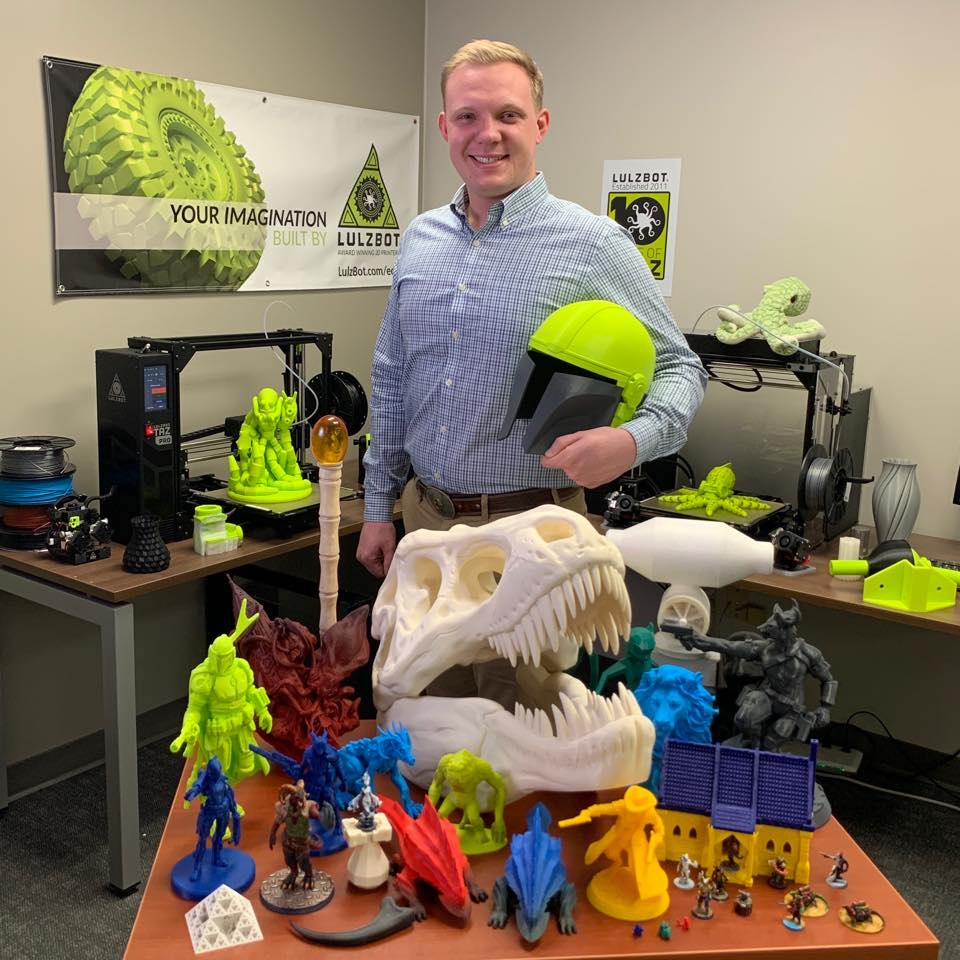

John Olhoft, who received his Bachelor of Science degree in agricultural and biosystems engineering from North Dakota State University (NDSU), is at the epicenter of the 3D printing universe.
As president of Fargo’s LulzBot and its parent company, FAME 3D, his NDSU degree has been indispensable.
“The engineering degrees at NDSU prepare you to be a professional problem-solver,” he says. “It doesn’t matter what the issue is, you’re able to take all of the given information, assess what you’re trying to find out, then develop a solution.”
Those steps are fundamental, he says, in any engineering career.
“When we’re designing, developing and deciding if what we’re making is a good idea, or if we’re vetting a supplier or a decision on material choices, that technical background is invaluable. It provides me with the ability to interpret what I’m faced with, take a technical approach and use that to say if this is possible or if it’s a bit far-fetched,” he says.
Olhoft, who graduated from NDSU in 2017 and is now pursuing an MBA, knew little about 3D printing in college, until a fraternity friend utilized a homemade 3D printer to replicate a miniature boat.
“And my mind was blown,” Olhoft says. “The next day, I want over to Fargo 3D Printing and I said, ‘You’re hiring me. I need to learn more about this.’”
He worked part time at the company fixing 3D printers, but took a winding path back into the industry after college.
“I always had a knack for engineering and machinery. I came from a small town in rural Minnesota and I guess I enjoyed working on those machines, so when it came time for my professional education, that’s what I decided to pursue,” he says about his degree in agricultural and biosystems engineering.
He interned for Cargill during college, working across the United States, then took a job in the food production industry upon graduation before later returning to Fargo.
“On the surface, it doesn’t seem like it fits in with 3D printing and what we do now, but it is actually closer than you might think,” he says. “Most of these large production plants actually use a large amount of programmable logic controls or PLCs, so it’s very similar in that sense to the 3D printers that we manufacture.”
He started his first company in 3D printing, Fargo 3D Printer Repair, in 2018 with his father and NDSU senior lecturer, Matt Olhoft.
In November 2019, John and two partners, Cooper Bierscheid and Ron Bergan, formed FAME 3D to purchase the LulzBot brand’s assets.
They packed those assets on 28 semis in Loveland, Colo., and moved the company to Fargo, opening in the new location Jan. 1, 2020, and building the first 3D printer two weeks later.
“At this point, we are the biggest and one of the only desktop 3D printer manufacturers in the U.S.,” John says.
The company has five different model lines: Mini 2, TAZ SideKick, TAZ Workhorse and TAZ Pro, along with the LulzBot Bio that replicates organic matter such as soft tissue for medical purposes.
“This past July, we launched a brand new printer that is 100% Fargo-designed, Fargo-built. We do all business operations here in Fargo,” John says. “Our newest model is interesting, because it’s the most affordable printer we’ve ever made, so we’re hoping for a lot higher volume on that line.”
With just over 75 employees, LulzBot utilizes an onsite print farm with 300 printers to manufacture many of its own parts to build its printers.
The company has 500 line items that it 3D prints for its own manufacturing process. LulzBot can create about 50% of its 3D printers by manufacturing its own parts, which illustrates the benefits of 3D printing.
Under the FAME 3D umbrella now rests LulzBot, Fargo 3D Printer Repair and Protosthetics, which 3D prints prosthesis and orthotics, working with clinics to scan an amputee’s limb and produce molds or a final piece for a more accurate organic shape.
With those types of applications, the world of 3D printing is endless, John points out.
“I think it’s set for some pretty explosive growth yet again. During COVID, you saw the need to make a lot of things fast. People illustrated their 3D printers could be used in that matter. We’re also entering a time where there’s a lot of supply chain shortages and the one thing we haven’t had to do is slow down,” John says.
“If I was relying on a network of 30 some vendors to get those 500 different parts, I would be very nervous right now. As long as I have raw plastic, I can turn it into whatever I want,” he says. “That is an invaluable tool that I think manufacturers will continue to see the value of, especially in times of supply chain uncertainty, if they know they can make it in-house.”
LulzBot’s clients include universities, schools, the military, hospitals and large manufacturers, such as Tesla, John Deere and Ford, as well as hobbyists.
At a the cornerstone of 3D printing, John points to only one other place in the world, in China, where 3D printing is as pervasive as in Fargo.
And Fargo has been welcoming, he says.
“It is very welcoming to entrepreneurship,” he says. “North Dakota’s been a good state to do a business in. … In Fargo, it’s very easy to contact people. Somebody knows somebody. It has more of a small-town feel.”
And it all started at NDSU.
“It’s been a pretty adventuresome journey,” John says.
3D printing class first of its kind at NDSU
November 1, 2021
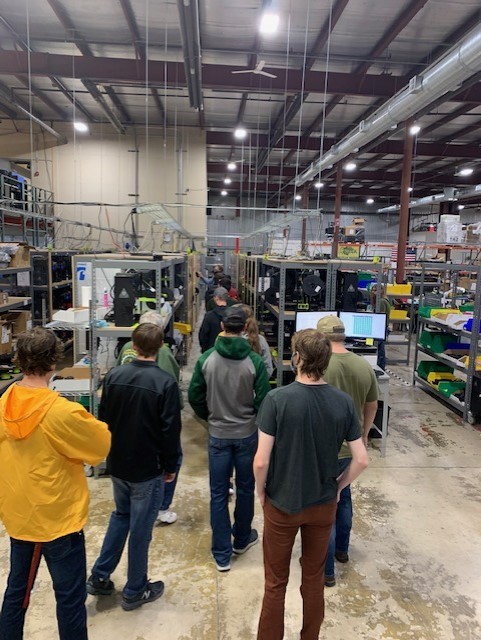
The course, Ag Systems Management 291, “Additive Manufacturing/3D Printing,” is new this semester as a trial course in the Ag Systems Management curriculum. Seventeen of the available 20 seats were filled for the first class, which is taught by Matthew Olhoft, a senior lecturer in the Department of Agricultural and Biosystems Engineering. This is the first course at NDSU dedicated solely to 3D printing. The department has seven 3D printers available to students. Olhoft has been involved with 3D printers for several years and recently attended a major conference on additive manufacturing.
“There is a need for our young engineers coming out of NDSU to be more aware of what they can do with additive manufacturing. More and more companies are switching over to additive manufacturing versus subtractive manufacturing, which is the milling of things like parts,” he said. “There’s just a lot more flexibility and the cost factors tend to be a lot cheaper, especially for producing prototype parts, with additive manufacturing.”
The class starts with a brief history of 3D printing, then moves into the different types of 3D printing and the different materials that can be used. It then explores the process of printing, from designing a project to printing the product. The class toured the manufacturing facilities of LulzBot in Fargo and Fargo 3D-Fuel, which manufactures filament. The president of LulzBot is a graduate of the Agricultural and Biosystems Engineering Department. Laser-etching and cutting and 3D scanning were also covered during the course.
A poll of the current class showed about half have 3D printed something before, while half are new at it, Olhoft said.
“3D printing is starting to get pervasive in our society in all kinds of levels. In the not-too-distant future, a lot of the parts that you need for machines will probably come to you via the internet. You’ll purchase an STL file and then you’ll actually print the part at your location or a local business,” Olhoft said. A farmer, for example, could go to a local supplier who will receive the file and print the part for pick-up the same day, he pointed out.
“Engineering students need to know what options are available, especially when it comes to materials they work with,” he said. “What materials can you use to create a part? It’s very easy to have a 3D printer available and be able to print something immediately and have your hands on it in a material that’s going to be an end-use product right off the printer.”



